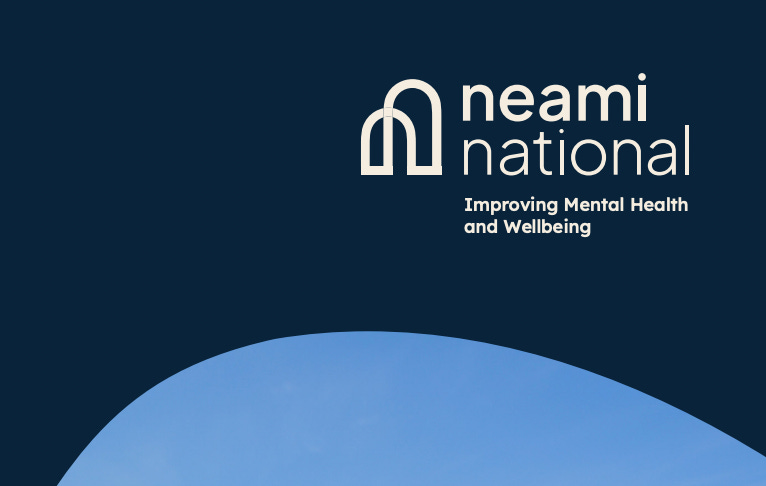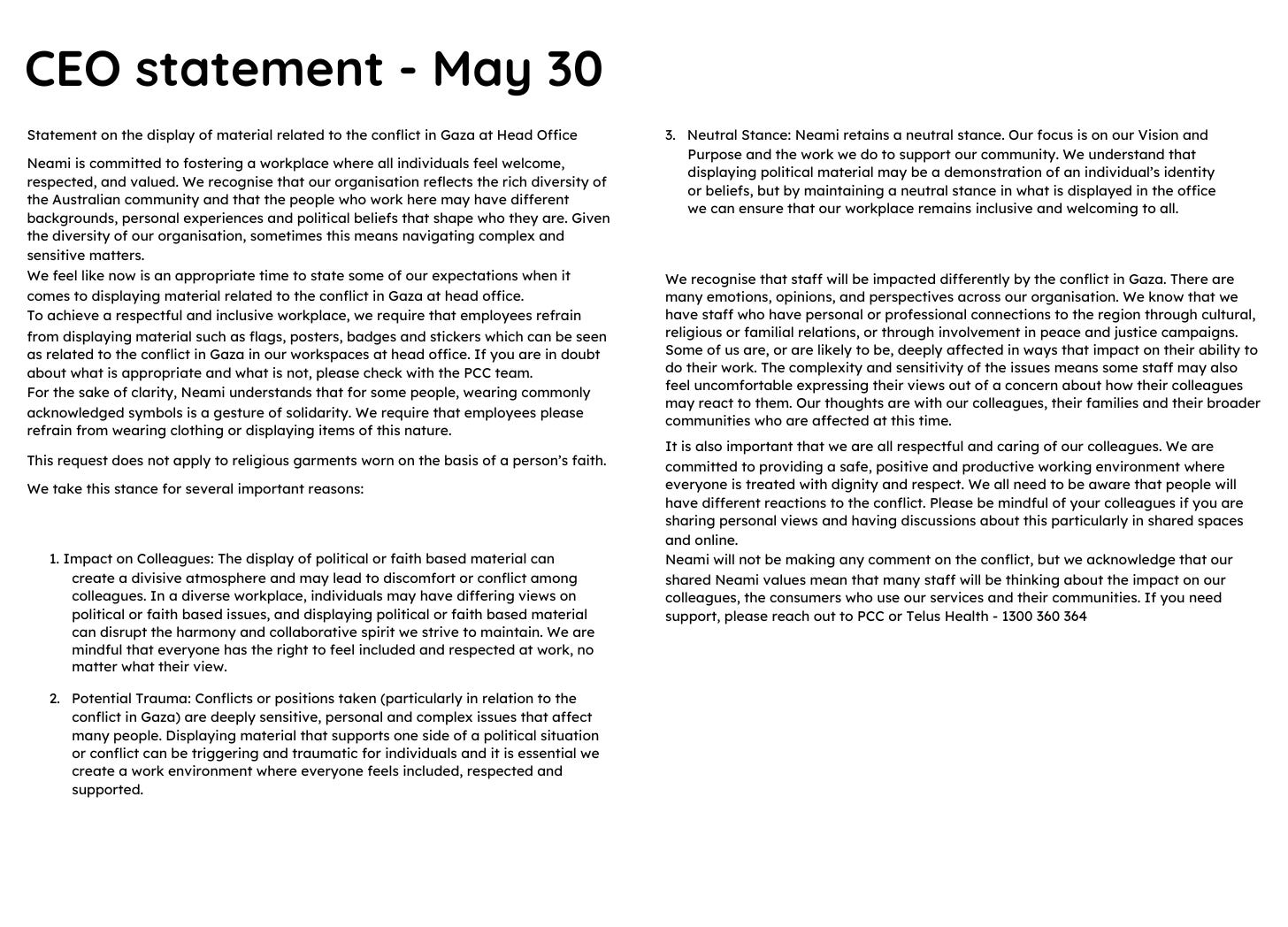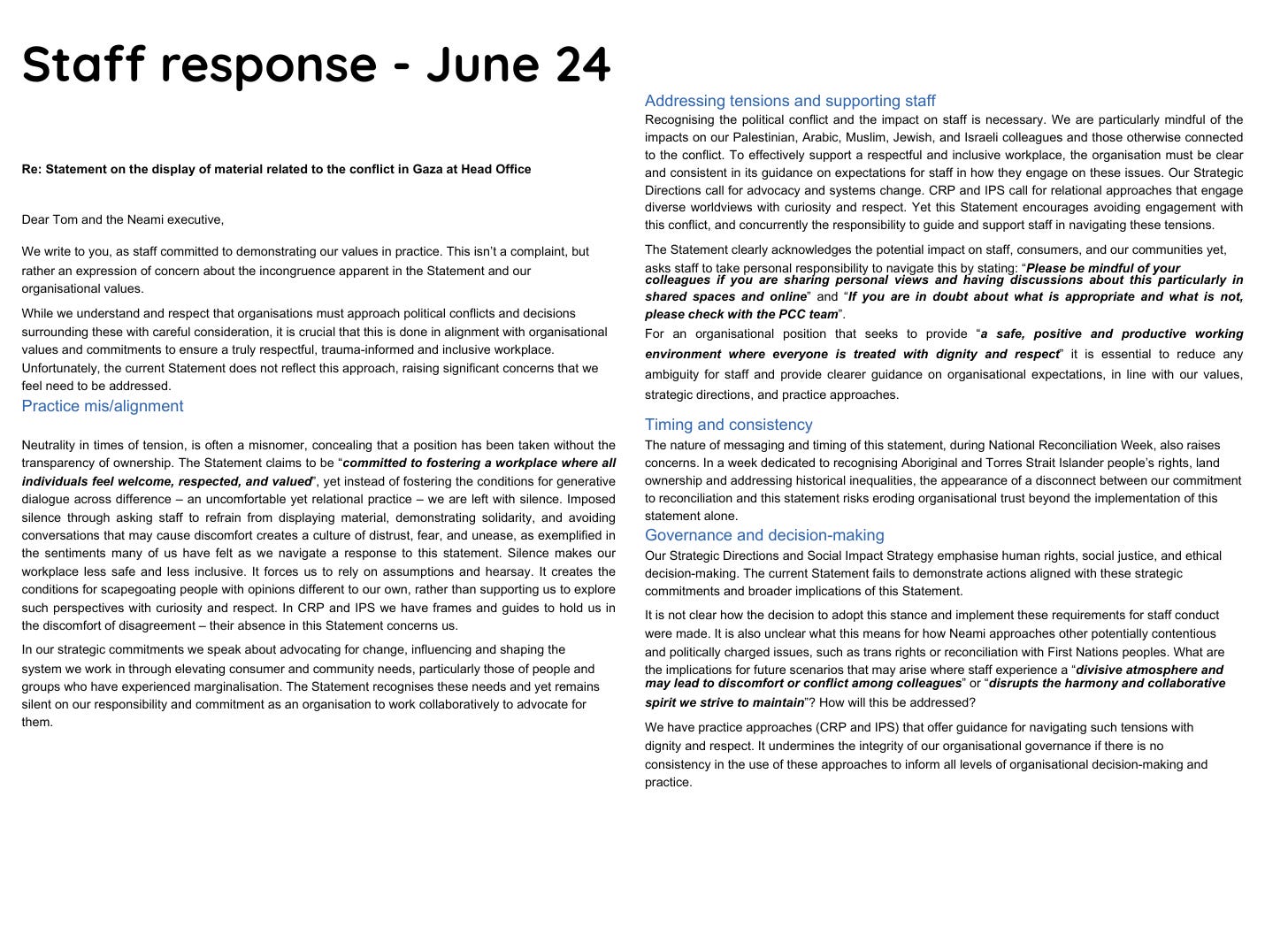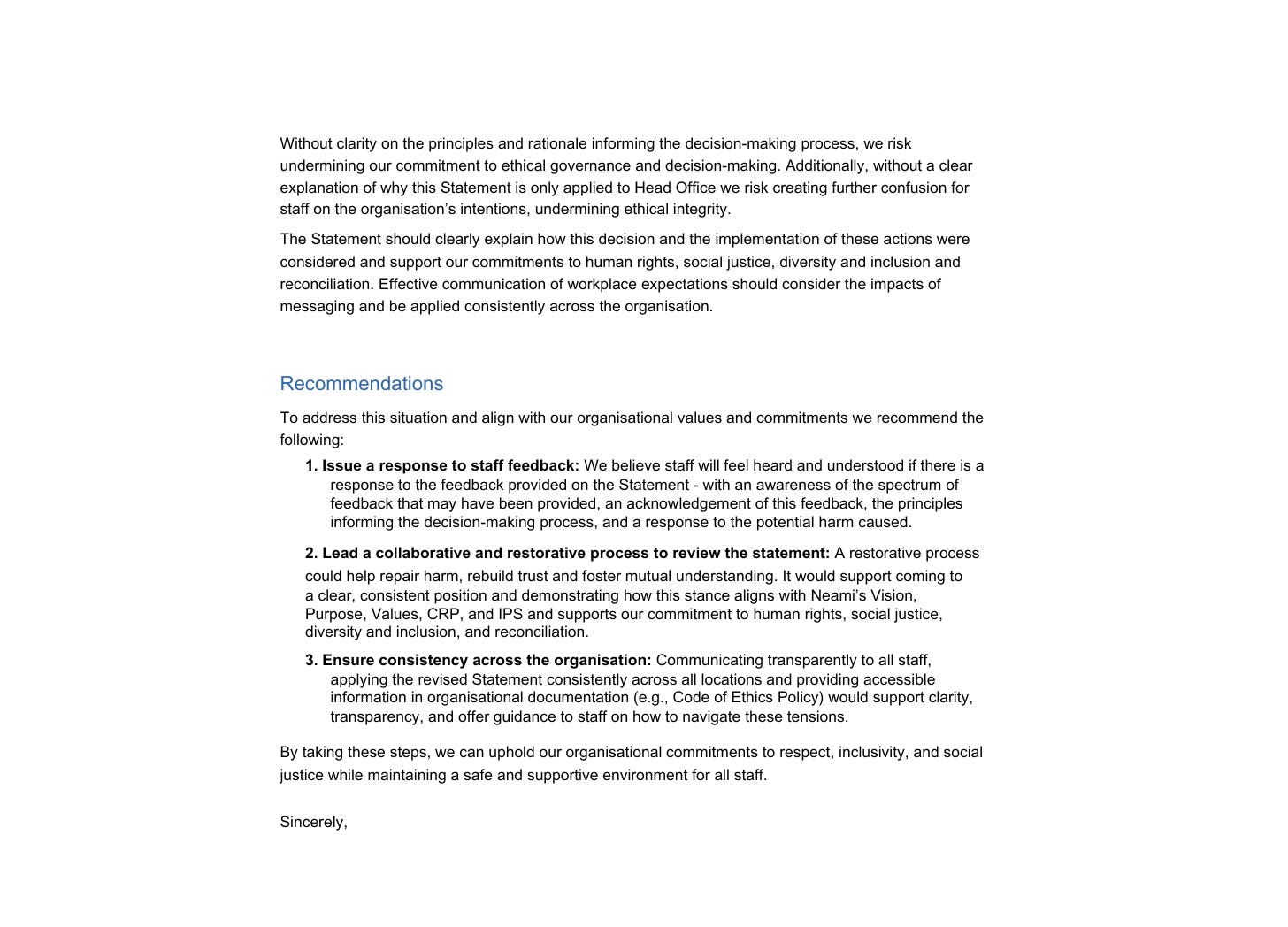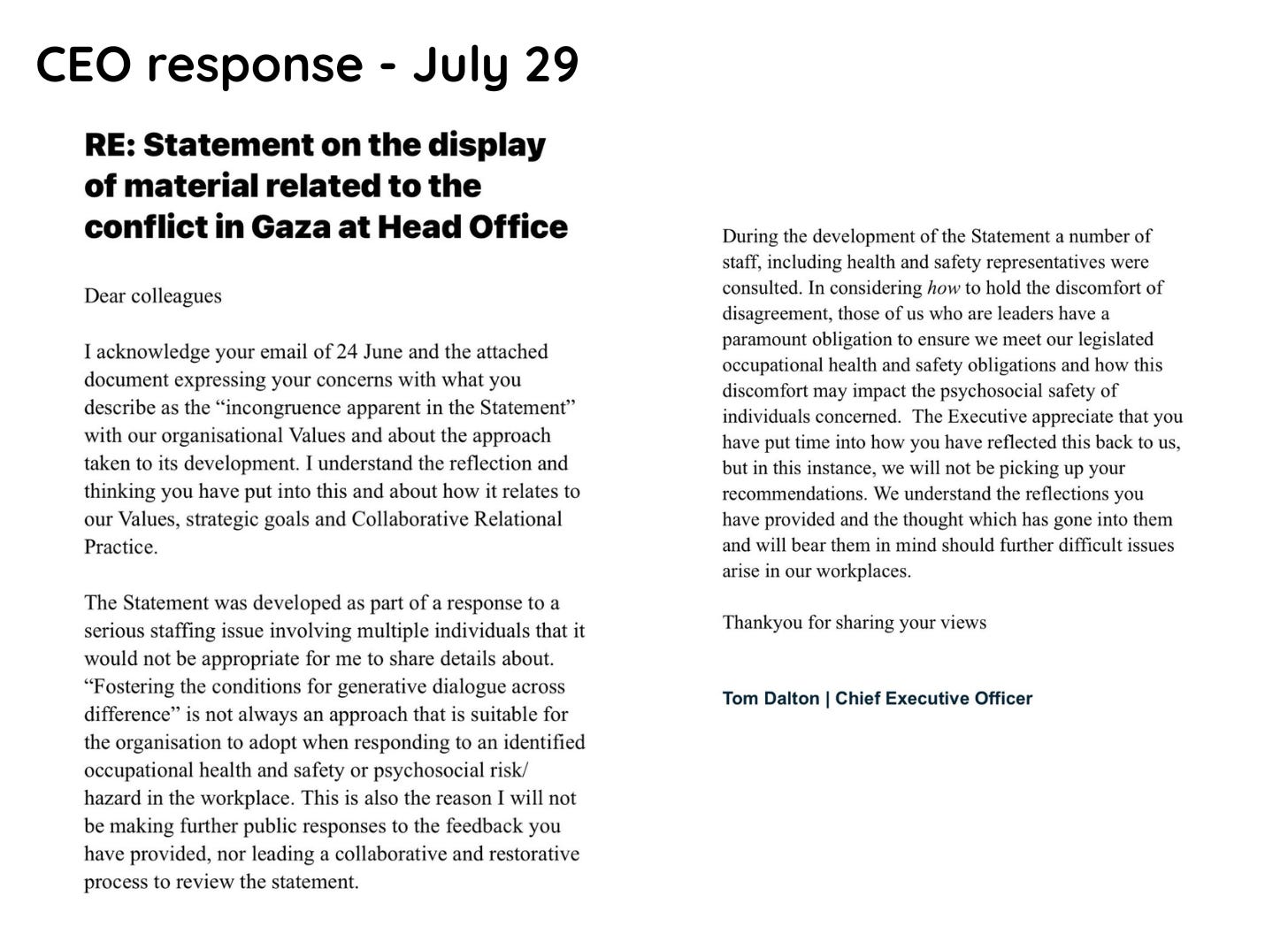Neami National bans staff from displaying solidarity with Palestinians
The mental health not-for-profit claims to stand for "human rights" and "social justice" – its Gaza ban suggests otherwise
Neami National, one of Australia's largest mental health service providers, has banned staff at its Melbourne head office from "displaying materials related to the conflict in Gaza".
In an internal email sent on May 30, and obtained by Deepcut, the Neami National CEO, Tom Dalton, prohibited "flags, posters, badges and stickers at head office" in order to "achieve a respectful and inclusive work environment".
"We make this decision based on the understanding that everyone has the right to feel included and respected at work, no matter their views," he wrote.
The CEO's statement expressed concern that the "display of political or faith based material can create a divisive atmosphere and may lead to discomfort or conflict among colleagues". The statement also insisted on maintaining neutrality to "ensure that our workplace remains inclusive and welcoming to all".
Deepcut understands that numerous staff at head office wore badges to demonstrate solidarity with the Palestinians in Gaza, and that a "Free Palestine" poster was displayed in the office.
On June 24, a collective email signed by 18 staff, also obtained by Deepcut, raised "significant concerns" with Dalton's position.
"Imposed silence through asking staff to refrain from displaying material, demonstrating solidarity, and avoiding conversations that may cause discomfort creates a culture of distrust, fear, and unease, as exemplified in the sentiments many of us have felt as we navigate a response to this statement. Silence makes our workplace less safe and less inclusive," the email read.
Dalton yesterday dismissed the staff email, writing in response in a separate email obtained by Deepcut that the "Executive appreciate that you have put time into how you have reflected this back to us, but in this instance, we will not be picking up your recommendations".
Neami talks social justice, silences solidarity with Palestine
Neami National is a vast, government-funded operation that, according to its 2024 Annual Report, "supported 34,000 people in Australia living with mental health challenges" through more than 70 services.
In 2024, it pulled in $160m in revenue with 54% of that funding coming from state governments. The not-for-profit also employs a sizeable workforce of more than 1,200 staff, with approximately 150 at head office.
Neami National makes note of its diverse workforce, with 16% of its staff at head office from diverse backgrounds. In his statement, Dalton cited "the diversity of our organisation" as a reason to ban expressions of solidarity with the Palestinians. Diversity, he wrote, "sometimes ... means navigating complex and sensitive matters".
The staff email, however, highlighted the "incongruence apparent in the [CEO] Statement and our organisational values", emphasising the disconnect between Neami National's stated principles and its position on staff solidarity with the Palestinians.
Neami National's Social Impact Strategy 2024-2034 mentions in its guiding principles "an intersectional approach grounded in human rights, social justice, self-determination, and equitable access to wellbeing, safety and inclusion". It states that Neami National values, respects and prioritises "diverse knowledge bases and perspectives".
"Everyone deserves to feel seen, heard and understood in their unique context, culture, faith, identities and experience of mental health and wellbeing," the not-for-profit's Strategic Directions 2024-2028 also states.
The CEO's statement, the staff email read, "fails to demonstrate actions aligned with these strategic commitments and broader implications of this Statement."
Potential legal risk
Neami National’s ban on staff expressing solidarity with Palestinians may raise a “significant legal risk” in light of Antoinette Lattouf’s successful case against the ABC, according to Sharfah Mohamed, lawyer at the Racial Justice Centre.
“Employers are entitled to issue directions to employees with which employees must comply, but these directions must be both ‘lawful’ and ‘reasonable’,” she told Deepcut.
“Where an employer does give employees a direction banning all forms of political expression in solidarity with Palestinians, our position is that such a direction is a form of indirect racial discrimination, and is neither lawful nor reasonable. Employers that take disciplinary action based on such a direction expose themselves to significant legal risk.”
Mohamed explained that the “Fair Work Act 2009 (Cth) prohibits the termination of an employee’s employment on the grounds of an employee’s political opinion. Lattouf v ABC notably confirmed that this protection extends to the expression of a political opinion.”
Deepcut sent numerous, detailed questions to Dalton, but received no response in time for publication.
Now to West Asia, where Gaza's famine is entering its worst-case scenario:
The famine has reached its direst stages, according to the Integrated Food Security Phase Classification (IPC). "The worst-case scenario of Famine is currently playing out in the Gaza Strip," the IPC, a UN-backed global food security monitor, declared in a new alert. Famine thresholds "have been reached for food consumption in most of the Gaza Strip and for acute malnutrition in Gaza City," the IPC said, adding that over "20,000 children have been admitted for treatment for acute malnutrition between April and mid-July, with more than 3,000 severely malnourished". At least 16 children have died of malnutrition since July 17, the IPC said.
Israel's deliberate starving of the Palestinians in Gaza has drawn escalating condemnation, not least from within its ranks. The former prime minister, Ehud Barak, called for civil disobedience in Israel to oust wanted war criminal and current prime minister, Benjamin Netanyahu. And for the first time, Israeli human rights groups have concluded Israel is committing genocide in Gaza, while another Israeli soldier has died by suicide, making it the sixth soldier suicide this month.
A Dutch intelligence report classified Israel as a foreign threat, citing disinformation campaigns seeking to influence public opinion and the country's politics.
The growing condemnation is doing little, however, to slow Israel's genocide. Israeli forces slaughtered at least 62 Palestinians on Tuesday, including 19 desperate aid seekers. On Monday, Israel killed at least 92 Palestinians in Gaza, including 41 aid seekers.
The widespread atrocities are an attempt by the US and Israel to increase pressure on Hamas to capitulate, Basem Naim, a senior Hamas official, told Drop Site News. Both the US and Israel withdrew from ceasefire negotiations at the end of last week, despite Hamas agreeing to the proposed framework with slight amendments. Naim accused Donald Trump of "playing a strategic game of deception". Hamas's lead negotiator was more forthcoming, saying in a speech: "There is no point in continuing negotiations under the siege, genocide, and starvation of our children, women, and people in the Gaza Strip."
The US burned through a quarter of its sophisticated Terminal High Altitude Area Defense (THAAD) stock in defending Israel during its unprovoked war on Iran. "Using so many THAAD interceptors in such a short period exposed a gap in the US missile defense network and depleted a costly asset at a moment when American public support for Israeli defense has reached historic lows," CNN reported.
Syria:
Syria's extremist regime held more direct talks with Israel, this time in Paris. The Israeli strategic affairs minister, Ron Dermer, met the Syrian foreign minister, Assad al-Shaibani, to explore a security agreement that could potentially lead to normalisation. The new extremist regime, headed by former al-Qaeda leader Ahmad al-Sharaa, is determined to consolidate its rule in Syria, and is seeking to align himself closer to the US-Israel-Gulf Arab axis in the region to guarantee his regime survives.
Part of consolidating Sharaa's rule requires internal opponents laying down their arms, which explains the regime's assault on the Druze city of Sweida this month. It also explains attempts to disarm the Kurdish forces in the country's northeast. The main Kurdish force, the Syrian Democratic Forces (SDF), enjoyed US backing for much of the Syrian civil war, but the US – now supportive of the new regime in Damascus – is calling for the SDF to disarm. The group is resisting – no doubt the massacres committed by the new regime against other Syrian minorities, the most recent being the Druze in the south, are a concern for the Kurds.
Sharaa is nevertheless trying to tighten his grip on all facets of the country, including the economy. Mimicking the Assad regime before him, Sharaa has set up a shadow committee to seize major companies in Syria with no public scrutiny. His brother, Hazem, is in charge of the committee. According to a Reuters investigation, the shadow committee tied to Sharaa's family has already seized US$1.6bn in assets, raising concerns the Assad oligarchy that dominated Syria is merely being replaced with another.
The self-appointed president has obviously identified a need to obtain some form of popular mandate to solidify his rule. Sharaa announced this week that Syria will hold snap parliamentary elections in September, except he will appoint one-third of the parliament. It remains to be seen how Sharaa will gain legitimacy from a snap election in a war-ravaged country with no political infrastructure – including political parties with the resources to compete.



